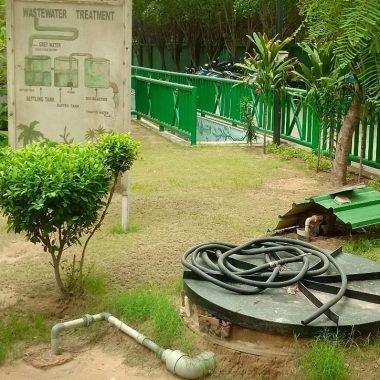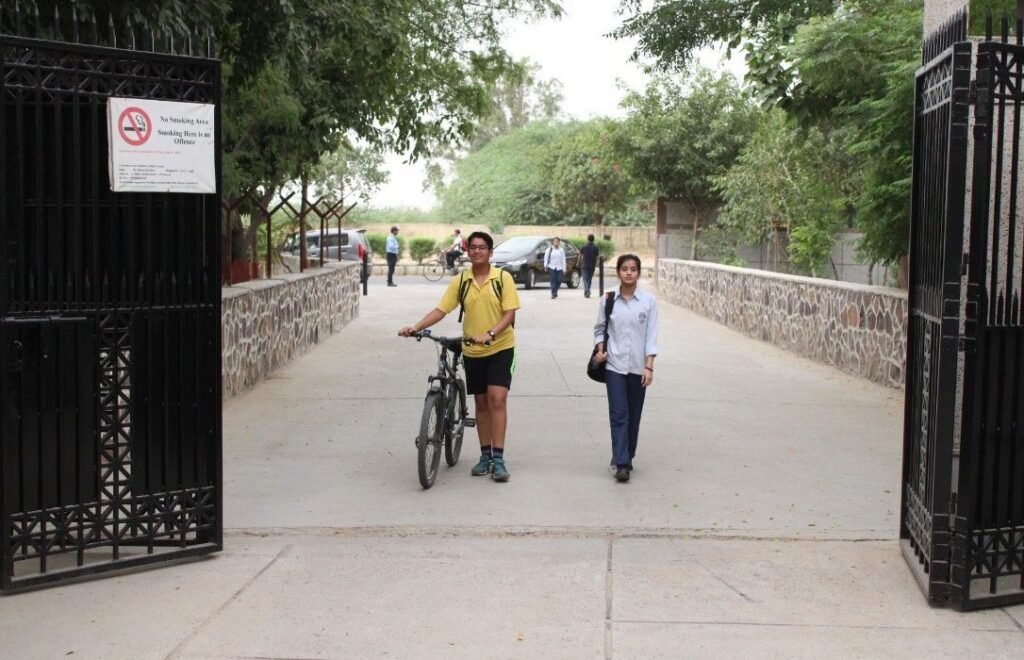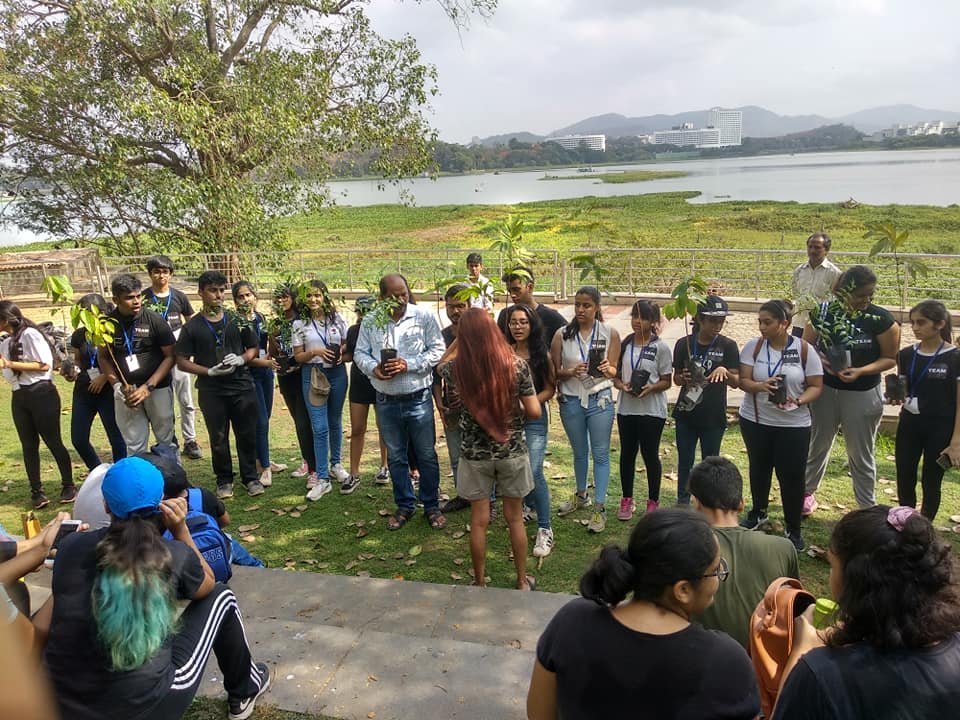
Climate Education
AND GREEN CAMPUSES FOR SAFER PLANET
FOUNDER/ PROJECT LEAD
Nisarg Foundation, Maharashtra with Deccan Education Society (DES).
PROJECT LOCATION
Maharashtra and Odisha – The project has spread its roots in almost all states of India and is currently being implemented in full throttle at the states of Maharashtra and Odisha. Both states are diverse as far as geographic terrain and biodiversity are concerned and also at the forefront of facing climate impacts right from droughts, flooding being located at the coastal line of India, heavy and erratic rainfalls, sea level rise to declining biodiversity due to climate change, impacting millions of people.

PROJECT GOAL
The Climate Reality Project India focuses its work on education and capacity
building in a fight against climate change through its flagship program of Teachers Training launched in 2011 and Green Campus Program launched in 2018. We prioritize local solutions and empowering educational institutes to take climate action and do walk the talk by reducing their carbon footprint.
PROJECT INTRODUCTION
The Climate Reality Project India focuses its work on education and capacity building in a fight against climate change through its flagship program of Teachers Training and Green Campus Program. It prioritizes local solutions and empowering educational institutes to take climate action and do walk the talk by reducing their own carbon footprint.
The approach for training the trainers on climate change issues includes principals conclaves, teachers training workshops for individual or group of educational institutes and, further supporting them through updated teaching resources, educational material, and imparting knowledge on climate solutions.
Running parallel to the teachers training program, Green Campus Program helps educators and institutes to implement solutions in clean energy, water conservation, biodiversity, waste, and clean air in schools and educational institutes to bring transformation in the society. Improving on the educational campuses by implementing green and sustainable practices will make educational institutes healthier, environmentally safe, and a living laboratory of learning for the children, staff and community.

DETAILS OF THE PROJECT
Climate Education and Green Campus Program will ensure that the educational institutions have capacities to teach about climate change and sustainable development, become temples of learning and laboratories for experimenting by students the various green practices possible in the future.
The activities planned in these areas are:
- Principals Conclaves on teaching climate change and sustainable development education for a safer planet in the state.
- Teachers training program on climate change at individual schools • Transforming selected model schools/colleges into Green Campus which are sustainable and climate-friendly by implementing green measures and recording the changes, followed by audit.
- Translation of essential training material and resources into Telugu. • Development of more state-focused content in local language. • Developing an online teaching and training system in Marathi language to support the teachers and schools.
- General Teachers Training Workshop on climate change for smaller educational societies in the region.
Taking the message to schools and colleges also means we will be able to involve millions of community members in the state and build a good will for the organizations in the process. We believe that these campuses transformation in five – Seven years will provide leadership, momentum, and set the trend to move towards sustainability in the region and community
SOP
- Principals Conclaves on teaching climate change and sustainable development education for a safer planet in the state.
- Teachers’ training program on climate change at individual schools
- Transforming selected model schools/colleges into Green Campus which are sustainable and climate-friendly by implementing green measures and recording the changes, followed by an audit..
View More
- Translation of essential training material and resources into Telugu.
- Development of more state-focused content in the local language.
- Developing an online teaching and training system in the Marathi language to support the teachers and schools.
- General Teachers Training Workshop on climate change for smaller educational societies in the region
Along with awareness and teachers training, green campus program prepares and guide academic institution to take climate action by adopting critical green measures in the campus. These essential practices involve the adaptation and implementation of sustainable practices on the following five thrust areas.
- Conservation
- Air Quality
- Waste Management
- Green Cover & Biodiversity
- Water Energy
Green campus ensures to adopt rainwater harvesting methods to capture at least 50% of run-off volumes from the roof and non-roof areas, to enhance groundwater and promote efficient use of water through various other measures.
Green campus ensures to install solar energy systems for at least 5% of annual total energy consumption and optimize energy efficiency by installing energy efficient lighting fixtures and BEE star rated appliances, thereby reducing the environment impact associated with energy use.
Green Campus encourages segregation of waste by installing at least two bins system for dry and wet waste, composting and practice 3R(Recycle, Reuse and Reduce) to reduce the amount of waste generated on the campus, apart from other waste management practice.
Green Campus encourages greenery within the campus by ensuring at least 20% of the non-built area is vegetative and sensitize about the importance of biodiversity and green spaces.
Green campus ensures to improve the air quality in campus to improve the overall health of students studying in school.
PROJECT IMPACT
- A number of Principals and Teachers trained from Schools and colleges on climate change and Sustainable development.
- Number of Events and Actions taken and recorded by teachers and schools after the training through teaching in classrooms, conducting awareness activities, and switching to sustainable habits and actions.
View More
- Number of consumers switching to clean and renewable energy, amount produced or saved.
- Increase in the greenery and biodiversity of the school and surrounding community. Organic farming initiatives.
- Amount of composting done, and reduction in waste. E-waste gathered. Plastic replacement and reduction. General Cleanliness.
- Reduction in water usage in facilities and quantity of rainwater harvested. Quantity of wastewater recycled.
- Improvements in ambient air quality inside the institutions by measuring dust and pollutants.
- Reduction in leaf litter burning. Changes in transportation means ( electric ), healthy practices followed.
- Events and campaigns organised in the community. Any changes recorded in the domain of Energy, Biodiversity, Waste , air, and
- Recognition of the campaign impact received from external sources like media, government, and social organizations.
SUSTAINABLE DEVELOPMENT GOALS
- Climate Action
- Life on Land
- Responsible Consumption and Production
- Partnerships for the Goals
- Quality Education






